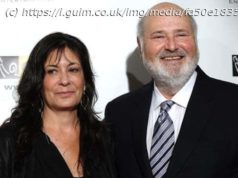The Hollywood producer of blockbuster films like the latest “Halloween” sequel is trying to become a serious player in television. It won’t be easy.
LOS ANGELES — The Hollywood studio Blumhouse knows how to make hit movies: Produce a film on the cheap, market it to audiences who love horror, and then sit back and watch the huge box office results roll in. It worked for “Paranormal Activity,” “The Purge” and “Get Out.” The latest example, its “Halloween” sequel, took in $77.5 million over the weekend for one of the best openings in horror film history.
Now Blumhouse, founded by the producer Jason Blum, is taking on television in a serious way. And it will have to see if its winning formula for film can translate to the crowded TV marketplace, where American viewers can choose from an estimated 500 scripted series this year alone.
It won’t be easy.
The same month that Blumhouse rolled out “Halloween” in movie theaters, it released the first installment of a monthly anthology series for Hulu called “Into the Dark.” If you weren’t aware that it has been streaming for over two weeks, you’re not alone. It has generated little buzz, certainly less than Netflix’s new horror series, “The Haunting of Hill House.”
Blumhouse also knows that it will have to move beyond monsters and the paranormal if it wants to reach a large TV audience.
“Our movie company makes seven to 10 movies a year,” Marci Wiseman, who runs Blumhouse’s TV division with Jeremy Gold, said in an interview. “We’re charged with populating the airwaves.”
She noted that there were only so many slots for scary television shows. “If we could, we would own every one of those slots and gladly do so,” she said. “But we also want to be omnipresent and be a studio that is making as many shows as we think deserve to have their stories told.”
Blumhouse has experienced success on TV before. It was a producer on HBO’s acclaimed thriller “Sharp Objects” this summer and the Emmy-winning documentary series “The Jinx” in 2015. But it has also been behind a series of forgettable one-season flops like “The River” (ABC), “Stranded” (Syfy), “Eye Candy” (MTV) and “South of Hell” (WE TV).
Seeking to inject the TV division with experience, Mr. Blum hired Ms. Wiseman, 55, a former executive at AMC, and Mr. Gold, 51, formerly an executive at Endemol Shine Studios and Fox, in 2016.Last year, Mr. Blum sold a 45 percent stake of the television unit to the British-based ITV Studios to raise cash to spend on content.
The anthology series on Hulu will consist of a new television movie under the “Into the Dark” banner every month for the next year. In addition, there is a television adaptation of the Blumhouse franchise “The Purge” on USA, and “Sacred Lies,” a young-adult drama on Facebook Watch. Going into production next month for Showtime is an adaptation of a Roger Ailes biography starring Russell Crowe. Several other projects are in production, including unscripted series.
In other words, not too many ghosts. Blumhouse executives explained that only 20 percent of the studio’s television projects will be traditional horror fare. (The movie division is somewhere closer to 80 percent, Mr. Blum said.)
Or, as Mr. Gold put it, “it’s simple sales: To only be peddling horror, that’s not a great way to scale a whole studio.”
Ms. Wiseman and Mr. Gold were speaking from the no-frills, cramped headquarters of Blumhouse in Historic Filipinotown. The pair work out of a small box of a room where a glass wall separates the roughly five feet of space between their seats. They often communicate by taping Post-it notes to the glass.
“That’s the thing with Blumhouse: You have all this production, but we don’t have a lot of space!” Ms. Wiseman said.
When Mr. Blum hired Ms. Wiseman and Mr. Gold, he also decided to rip up his game plan for television. He wanted to build a studio where Blumhouse would be calling the shots.
“In the movies, we’re running everything. We make all the decisions,” Mr. Blum said in an interview. “On the production, we’re in charge 100 percent. And so I’d go from that to television, where I was asking permission to brush my teeth. For everything! It was extremely frustrating.”
Still, Mr. Blum described building a successful independent studio as a big financial risk.
“It is harder than ever to cut through the clutter,” said Brian Wieser, an analyst at Pivotal Research Group. “The flip side to that there is more opportunity for independent players to develop content. It’s harder to have massive audiences but it’s also easier to find someone take a chance on quality content.”
One of the first orders of business for the television unit was to discard the company’s policy of shoestring budgets. The reason? Streaming services like Netflix, HBO and Amazon are more than happy to spend more on one episode of a TV series — $5 million plus — than Blumhouse does on some of its feature films.
“I’m not saying people are saying, ‘Please spend as much money as possible,’” Ms. Wiseman said. “But there are just a bunch of buyers that are not price-sensitive.”
If they can pull off that trick, they’ll have continuing series on basic cable and streaming services. And they’ll have glossy shows, like “Sharp Objects” or the Ailes limited series, where, Ms. Wiseman explained, “the economics may not be as fantastic but the kind of heightened storytelling is really the goal.” Essentially, to burnish the reputation of the Blumhouse brand.
“Into the Dark” is one of the projects reminiscent of its Blumhouse film brethren. The show is cheap to make — right around $2 million per television movie — and it will be horror oriented.
And if “Into the Dark” is not generating as much attention as “The Hill of Haunting House” — neither Hulu nor Netflix discloses viewership statistics — everyone is urging patience.
“I don’t know if ‘Into the Dark’ is going to work or not,” Mr. Blum said. “Is it good that people aren’t talking about it? Of course not. I want more people to talk about it. But I don’t know what metric to use.”
Meanwhile, the TV adaptation of “The Purge” has shown solid results in the six weeks it has been on USA, averaging roughly two million viewers, according to Nielsen’s delayed-viewing data.
It is USA’s biggest ratings get of the year among adults under 50, though the numbers were not big enough to crack the top-five-rated scripted cable shows in recent weeks.






